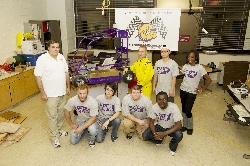University News
Electric Leatherneck Racing Team Seeking More Than a Racetrack Win
December 13, 2011
MACOMB, IL – When the Western Illinois University Electric Leatherneck Racing Team tries for the checkered flag at the Indianapolis Motor Speedway in May, they will have semesters of experience and education backing them up.
The racing team, made up of 14 WIU students and two faculty members, has spent the past 14 months researching, designing and crafting the school's first electric race car.
The team is led by WIU Professor Dave Hunter and was the original idea of College of Business and Technology Dean Tom Erekson. The car was built entirely with donations of equipment, cash and labor, such as the extensive welding done by Fusion Tech of Roseville (IL). Macomb High School automotive and small engines teacher Kelly Sears, who has raced go-karts for about 35 years, also helped WIU students with the car's initial set-up.
The development of the car began during the Fall 2010 semester. Lithium ion batteries power the vehicle with 16 3.2-volt cells bolted together into a 48-volt system.
The top vehicle speed is about 45 mph and designers estimate two battery changes will be necessary to complete a 100-lap race.
Competition
Team members are looking forward to competing at upcoming events at Purdue University and at the Indianapolis Motor Speedway. The races are part of a national electric go-kart university program called the evGrandPrix Consortium, which encourages college students to study development of the technology behind electric vehicles.
This year's focal race is a 100-lap road course, held during Speed Week of the Indianapolis 500, is scheduled for May 12. The WIU team attended last year's event, but ran into deadline issues for getting their battery power approved in time for the drop of the green flag.
"Approval of our battery management system came two weeks before the race and our batteries were delivered two weeks after the race," Hunter said. "We were working with some of the other teams to try to get the car on the track in time, but we were unable to. Purdue had batteries available, but there was an electrical problem. Some of the best crew technicians offered assistance, but we just couldn't get it on the track."
The 2010 two-day event included 52 race teams from 17 U.S. and two foreign universities.
Hunter said students are judged on several criteria, not only including the position they finish the race in, but also their energy efficiency and their community outreach and service.
"We have a Facebook page and we had the vehicle in a Macomb parade," Hunter said of the group's community outreach projects. "We also have taken the car to Illinois State University's Electric Vehicle Night."
The goal of the program
The educational component of the WIU electric car program is to teach students about all aspects of getting the vehicle ready for competition, ranging from chassis and suspension construction to programming the motor drive and data acquisition. Any WIU student can join the team; current academic majors of the students in the program include engineering technology, biology and accounting.
"It's quite a learning experience," Hunter said. "There are a number of dimensions to this; the purpose is about introducing the students to alternative vehicle propulsion systems and putting them with their peers nationwide."
As part of the competition, students must continually update a thick notebook of each adjustment they make to the electric vehicle.
"Safety is the utmost issue," Hunter said. "They also have a 70-page safety document."
Nero Omu (Galesburg), a graduate student in WIU's manufacturing and engineering systems program, said she began working on the car project last semester after overhearing classmates talking about the project.
"Right now we're trying to design a cover for the back of the car," she said. "We've also worked on design and mechanical work."
In the beginning
Dean Erekson brought the electric vehicle program idea with him after working on similar projects during his time at Bowling Green State University (Ohio) and at Brigham Young University (Utah).
"I called Dave (Hunter) and told him I'd like to do this," Erekson said. "I've seen the benefit to the students in the form of mentored learning; it goes way beyond the classroom."
Hunter said students and faculty have put "hundreds of hours" of work into the vehicle to get it track-ready.
"We built it from scratch; the students cut and fit the roll cage components and then Fusion Tech welded the chassis together for us," he said. "The students designed and fabricated most of the parts of the vehicle."
Students work on the vehicle in their free time and the group meets every Thursday at 6 p.m. in Knoblauch Hall.
For more information on the electric car program at Western e-mail Hunter at gd-hunter@wiu.edu or visit the team's Facebook profile at www.facebook.com/profile.php?id=100002227443369.
Posted By: Jodi Pospeschil (JK-Pospeschil@wiu.edu)
Office of University Communications & Marketing


Connect with us: